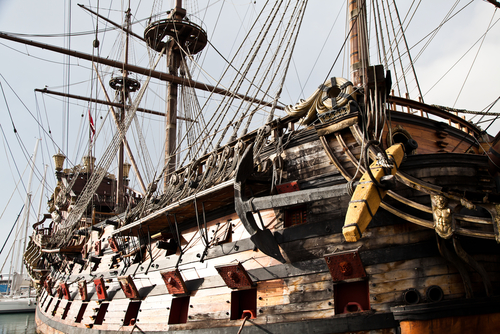Atlas Shrugged, part I, chapter VI
As Dagny drifts through the crowds at Hank’s party, she overhears a conversation:
“Last night,” said the spinster, “I stayed awake because of the shooting. There were guns going off all night, way out at sea. There were no flashes. There was nothing. Just those detonations, at long intervals… Everybody down on the shore knows what it was. It was Ragnar Danneskjold. It was the Coast Guard trying to catch him.”
“Ragnar Danneskjold in Delaware Bay?” a woman gasped.
“Oh, yes. They say it is not the first time.” [p.145]
Hank’s guests have an As-You-Know-Bob expository conversation about the terrors of Ragnar Danneskjold, a modern-day pirate who’s been preying on shipping in the Atlantic Ocean. We’re told that “the People’s State of Norway” has offered a million-dollar reward for his head, that he seized a relief ship loaded with supplies for “the People’s State of France,” and that his ship is better than any in the navy of “the People’s State of England”.
Although we previously heard about the looters’ takeover of Mexico, this is the first real hint that the same thing is happening all over the world, since Rand considers any invocation of “the people” to be a sure sign of evil. (Better not tell her that the U.S. Constitution begins with “We the People” and not “We the Individuals” – she worships America, and I don’t think she’d be able to handle the cognitive dissonance.)
What’s remarkable is that this apparently swift, easy, and more-or-less simultaneous socialist takeover of every country in the world other than America happens offscreen. It’s presented as a fait accompli, and we never really hear about it except through offhand mentions like these. This hearkens back to the question I raised in my first post about what’s causing this. How is it possible that everyone else in the world just happened to start thinking the same way at the same time? Especially if socialism is as manifestly disastrous as Rand says it is, shouldn’t there be at least a few countries that see their neighbors’ misery and buck the trend? Also, why isn’t there a flood of tired, huddled capitalist refugees from Europe arriving in the ports of New York?
“He’s been seen off Nantucket, too. And at Bar Harbor. The newspapers have been asked not to write about it.”
“Why?”
“They don’t want people to know that the navy can’t cope with him.”
“I don’t like it. It feels funny. It’s like something out of the Dark Ages.” [p.146]
Well put, nameless woman at Hank’s party! I agree. A pirate ship lurking off the coast, seizing and destroying commercial ships, sounds very much like something out of the Dark Ages. But it’s curious that Ayn Rand, of all people, should point that out.
I just finished reading Paul Collins’ The Birth of the West, a book about how the civilization that we now call “Western” emerged from the violent anarchy of tenth-century Europe. In those days, Europe wasn’t made up of nations, but loose confederations of squabbling city-states ruled by a patchwork quilt of petty kings and local strongmen. One of the themes of this time was the constant threat from outside raiders: in the east, the Magyars; in the south, the Saracens; and in the west, the Vikings, who were a particular threat in England, Ireland and Scotland, but who also invaded the continent as far inland as Paris. All of them sacked towns, plundered monasteries, and terrorized the countryside. Some kings fought them, with varying degrees of success; others paid exorbitant tributes to make them go away.
The point is that these incursions arose from a breakdown of law and order. With no strong central power or real ruling authority, isolated communities were unable to defend themselves against outside pressures. It took the rise of the Holy Roman Empire to restore some measure of peace and stability to the war-wracked continent.
Although Europe is no longer menaced by barbarian marauders, there’s an obvious modern analogue, which is Somalia. With the collapse of government in the aftermath of a bloody civil war, Somalia has been an anarchy for over two decades, and as a result has become a haven for pirates who take ships and crew hostage to extort ransoms. (One of the most dramatic episodes was the 2009 seizure of the Maersk Alabama, which ended with Navy SEAL snipers killing the pirates who had taken the captain hostage.) Things aren’t much better on land, with violent militias like the Shabab seeking to impose Islamic law.
This is lost on the libertarians who claim in all seriousness that Somalia, because it lacks a functioning central government, is a capitalist paradise. The Ludwig von Mises Institute declares, “Somalia has done very well for itself in the 15 years since its government was eliminated”, and Reason extols “The Anarchy Advantage in Somalia”. That “advantage” was probably lost on the tens of thousands of people who died in a 2011 famine, exacerbated by Shabab intransigence.
The point is that this is what always happens. Whether in Dark Ages Europe or modern-day Somalia, a power vacuum will inevitably be exploited by ruthless and ambitious thugs who try to seize power and dominate others. A peaceful free market isn’t a natural state of affairs, but a construct of civilization that needs to be protected by the strong arm of a state. Rand depicts Ragnar Danneskjold as the kind of problem that arises from too much government, when in reality it’s a problem of too little.
Other posts in this series:
